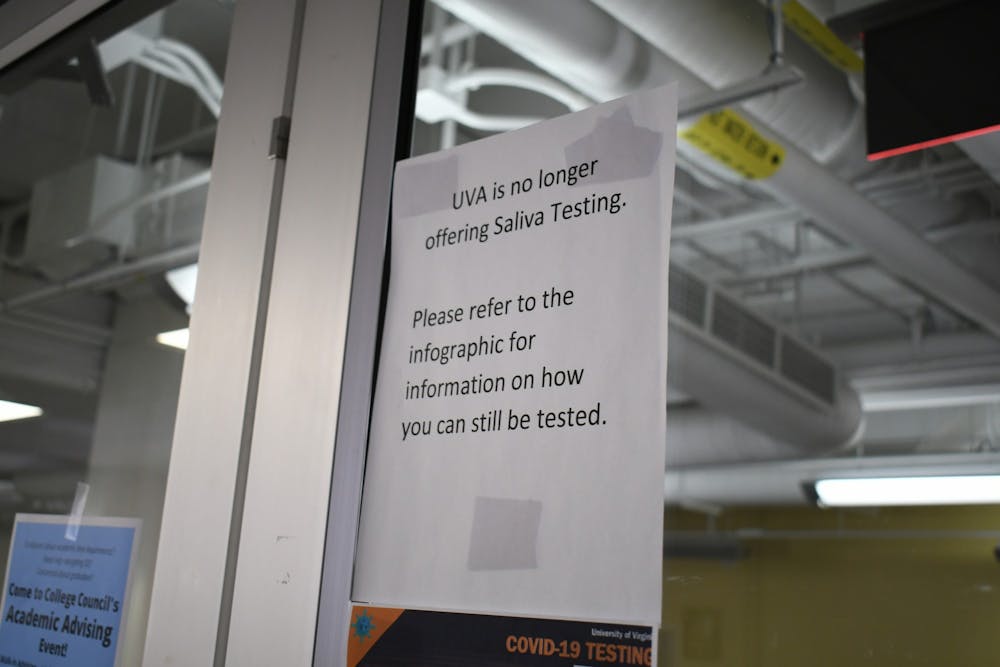Per the Centers for Disease Control and Prevention, we are in the final stages of the pandemic. Reflecting CDC guidelines, the University recently updated its public health guidelines on March 18 and March 25. What likely caught most students’ eye was the change to the masking policy and testing requirements. Masks are now optional in classrooms and non-clinical U.Va. Health facilities, while saliva testing for unvaccinated students ended and prevalence testing is no longer available in the basement of Newcomb Hall. However, symptomatic students can still get tested through an appointment at Student Health and Wellness and asymptomatic students have access to a limited number of free at-home tests through the University — in addition to testing available at retail pharmacies, online and through the federal government. We commend the University for following the CDC’s updated guidelines. However, there are still policies that should stay in place to ensure everyone’s safety until we complete this final stretch.
Aligning nearly entirely with the CDC guidelines, we are in full support of the University's updated policies on masking. For context, the CDC’s most recent updates establish different guidelines based on the risk of COVID-19 in various geographical locations — Charlottesville is deemed a low risk location.
Students — although the University does not require exposed or symptomatic students to mask — as this is nearly impossible to regulate — we encourage you to do so. Fellow students, we implore you — consider that there are still people in our community who may be at increased risk for worsened symptoms, should they contract COVID-19. A reminder about common decency — follow the University’s suggestion and be respectful of those around you. As leadership wrote, “treat each other with respect and common courtesy” and be “willing to put on a mask when asked, communicat[e] masking preferences in advance or [offer] to meet virtually if appropriate.” As we all follow these recommendations, remember that one is not entitled to anyone’s personal health information — if someone requests you wear a mask, please put one on.
While we applaud the University’s continued available testing for symptomatic students — who should never be hindered from testing — we contend that the University must have more accessible testing for asymptomatic students. First, we must return to PCR tests rather than rapid tests — the former is known to be much more reliable, particularly for asymptomatic individuals. We also demand the University reimplement an unlimited supply of tests for students — the current system only offers students an unspecified but limited number of tests. Students must be able to test as often as is necessary.
In order for voluntary testing to be effective — meaning to ensure that those who have symptoms or are exposed actually get a COVID-19 test — there must be systems in place to ensure students who contract COVID-19 don’t face negative academic consequences. Students should not avoid getting tested because they are worried they will test positive and be barred from attending class. Further, students who need to quarantine deserve hybrid course options. This might range from recorded lectures to hybrid classes — at the discretion of professors, of course — but the central focus is that there must be an established standard to ensure students who must quarantine do not face negative academic consequences. These class options provide a crucial level of protection to professors as well — in the same vein as students, professors should not be forced to hold in-person classes if doing so risks their health or the health of their loved ones.
Looking forward, we recommend that the University consider implementing permanent alternative class options when students cannot attend for other reasons out of their control — from student athletes traveling to individuals sick with the flu. Those of you reading this article have lived through the pandemic, and we cannot forget that many did not. At the very least, we should learn something from the past two years. Hybrid or recorded lectures can allow professors to ensure an education is still accessible to those who cannot come in person for whatever reason.
The pandemic is nearly over. Cases are decreasing, rapid tests are widely available and most people have access to vaccinations and booster shots if they want them. Now, we must focus on a post-pandemic future. We have the opportunity to learn from the past two years — we cannot squander it.
The Cavalier Daily Editorial Board is composed of the Executive Editor, the Editor-in-Chief, the two Opinion Editors, their Senior Associate and an Opinion Columnist.





